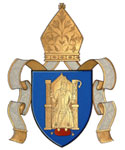 |
 |
News
JOINT CHRISTMAS MESSAGE

The Bishop of Clogher Right Revd John McDowell.
Monsignor Joseph McGuinness Diocesan Administrator.
from Bishop John McDowell, Church of Ireland Bishop of Clogher, and Monsignor Joseph McGuinness, Diocesan Administrator of Clogher
“For without Him nothing was made that has been made...” John 1:3
Looking around, both close to home and in many places around the world, there seems to be little agreement or unity about very much. Of course it is the nature of human beings to be argumentative. Otherwise they would hardly deserve to be called by that name. Human nature seems to consist of a straining after truth (a good thing) and a desire to be proved right all the time (not such a good thing). At its best that very argumentativeness has evolved into a foil against allowing differences to become bottled up and so entrenched that rather than arguments we end up with daggers drawn.
In the long term our wellbeing as individuals and as communities depends on a degree of self-suspicion and an acknowledgement that, when we have a chance to think about it, the other person might be more right than I am after all. Above all it depends on an agreement about our common humanity; that all things were made by him and without him nothing was made that has been made. As a famous Irish writer once noted: “Christ was the first person to conceive of mankind as a unity”.
Generally at Christmas time there is one centre of unity that predominates in our minds; the unity of the family. Even though we know little enough about most of them, we look to the Holy Family at Christmas as a kind of example or pattern of family life. In the past that could be a rather sentimental picture but a little reflection on the story as it comes to us in the Gospels means we have to acknowledge the oddness of much of the story, not least in a tiny baby leaving Mary’s warm womb for the coldness of an outhouse and into an uncertainty which is the bitter experience of many displaced people.
And for believers the type of family that God chose to be born into in the form of Jesus helps us to understand the nature of God;what God is like and how in the words of St John he “reveals his glory...full of grace and truth”. It is very difficult to read or to listen to the Gospel story and to escape the conclusion that a major part of the glory of God is that, for our sakes, he became poor. He didn’t have poverty foisted on him, as so many have today, by unjust structures in society (there is no glory in that). Instead God chose a certain way of life and adopted a certain attitude to possessions which reflected his glory.
He became poor by choosing to share the limitations, frustrations and harsh realities of our sort of life - our pains, our sorrows and even our death. The stable is the symbol of Christ’s poverty which is seen most clearly in his simplicity. Perhaps that is why St Francis of Assisi is the most universally revered of all the saints. His simplicity and poverty weren’t sentimental; he had a pretty fierce side. We are afraid of becoming poor; he dreaded that any person should be rich.
Everywhere you will go over the next few days - in shops as much as in churches- you will come across images and statues of the Holy Family. Here are some words of Michael Ramsey which might help to put that scene into perspective:
“Come to Bethlehem once again: see the stable, see the child. Knowing that he is God made man, knowing that he who was rich has become poor for us - let us kneel in the darkness and cold that is the symbol of our cold and chilly hearts, and say in a new way, “yours is the kingdom the power and the glory forever”.
And may the glory of Christ surround you and your families and all who you love as well as those who you struggle to love this Christmas time.
+John McDowell
Mgr Joseph McGuinness